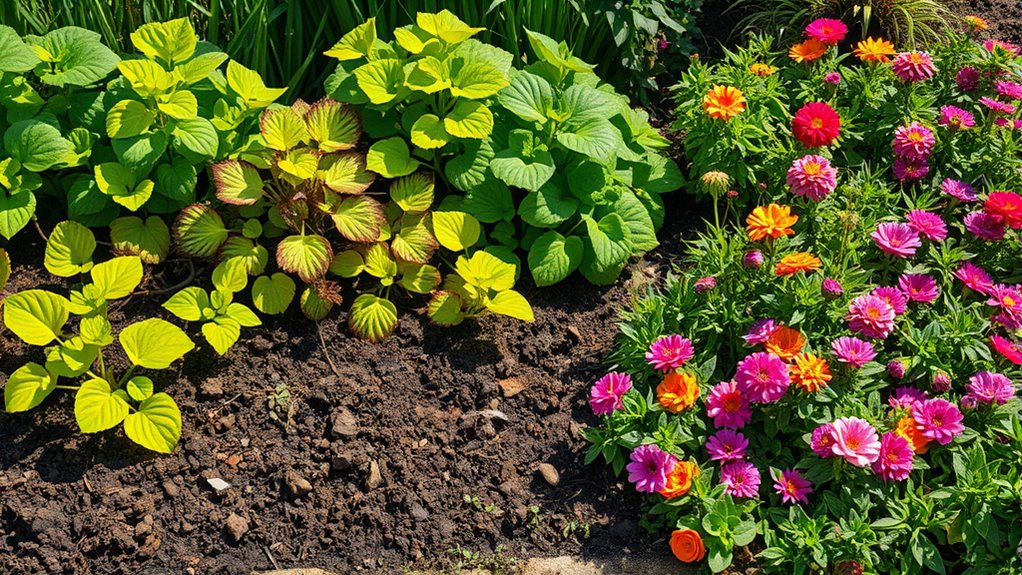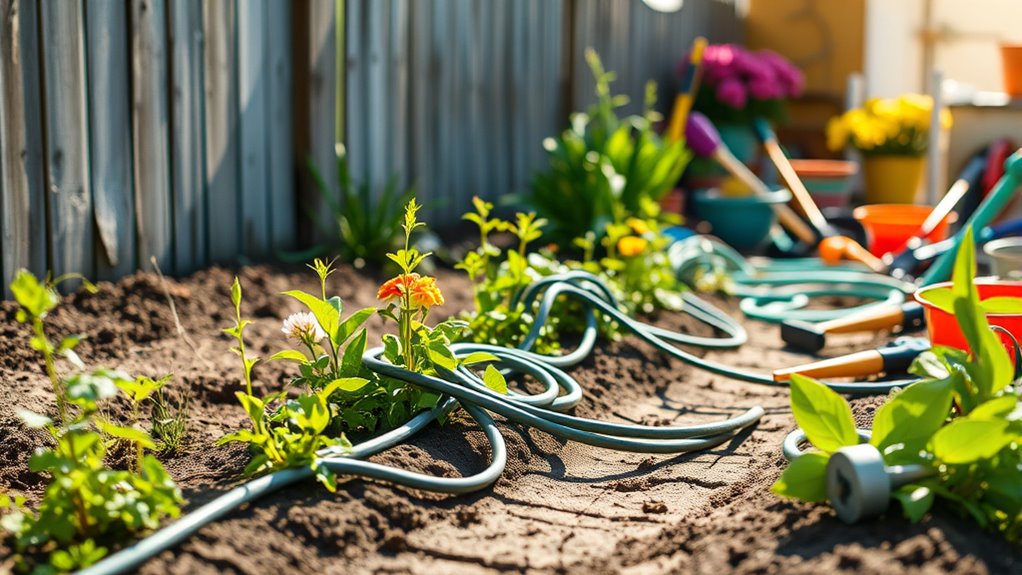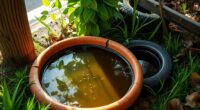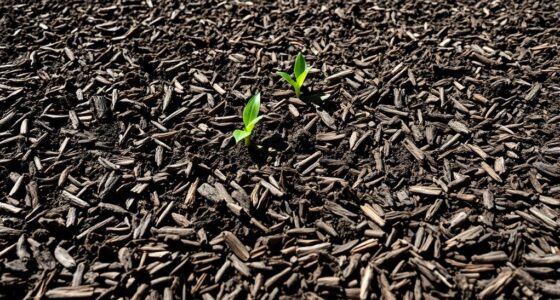To avoid common beginner gardening mistakes, start by testing your soil and adjusting pH and nutrients properly. Plan your planting schedule around weather and space plants correctly for airflow and growth. Regularly inspect for pests, use natural control methods, and rotate crops to prevent soil depletion and pests. Don’t forget to water appropriately and follow care instructions. Neglecting these key practices can hurt your garden’s success—keep going for tips to grow healthier, more productive plants.
Key Takeaways
- Test soil pH and add amendments to ensure proper nutrient availability before planting.
- Regularly inspect plants for pests and use natural methods to manage infestations.
- Follow recommended planting times and maintain proper spacing for healthy growth.
- Practice crop rotation and avoid planting the same crops repeatedly in the same spot.
- Plan garden layout, follow care instructions, and provide consistent watering for optimal results.

Starting a garden can be exciting, but beginners often make common mistakes that hinder their success. One of the most critical errors is neglecting proper soil preparation. You might be tempted to plant directly into the ground without testing or amending the soil, but this can lead to poor plant growth and weak yields. Before planting, take the time to evaluate your soil’s health. Use a soil test kit to check pH levels and nutrient content. If the soil is too acidic or alkaline, you’ll need to add amendments like lime or sulfur. Improving soil structure with organic matter, such as compost or aged manure, boosts drainage, aeration, and nutrient availability. This groundwork sets a strong foundation for healthy plants and reduces the risk of pests and diseases, which often thrive in poorly prepared soil.
Proper soil preparation is key to healthy, productive gardening.
Pest control is another area where beginners frequently stumble. Many underestimate how quickly pests can invade a garden if not managed early. Instead of waiting for an infestation to take hold, adopt integrated pest management (IPM) practices. Start by inspecting your plants regularly for signs of pests or damage. Handpicking larger pests like caterpillars or beetles can be effective. For smaller insects, introducing beneficial insects such as ladybugs or lacewings can naturally keep pest populations in check. It’s also wise to use organic sprays or homemade solutions, like neem oil or insecticidal soap, as a first defense rather than immediately resorting to chemical pesticides. This approach minimizes harm to beneficial insects and reduces chemical buildup in your soil.
Furthermore, avoid planting your garden too early or too densely. Overcrowding hampers air circulation and creates moist environments conducive to pests and diseases. Make sure to space plants appropriately based on their mature size and planting instructions. Proper spacing not only helps prevent pest problems but also improves soil conditions by allowing roots to access nutrients and oxygen more efficiently.
Another common mistake is ignoring crop rotation and soil health over time. Continuously planting the same crops in the same spot depletes specific nutrients and encourages pest buildup. Rotate different plant families each season to maintain soil vitality and reduce pest problems.
Frequently Asked Questions
How Often Should I Water My New Plants?
When you’re figuring out watering frequency, pay attention to your plants’ needs for proper plant hydration. Usually, you should water new plants once or twice a week, but this depends on factors like soil type and weather conditions. make certain the soil stays moist but not soggy. Check the top inch of soil regularly—if it feels dry, it’s time to water again. Adjust your watering schedule as your plants grow.
What’s the Best Time to Fertilize My Garden?
Timing is everything when it comes to fertilizing your garden. You should fertilize during the active growing season, usually in spring and early summer, to give your plants a boost. Use the right fertilizer types, like organic or slow-release, based on your plants’ needs. Avoid fertilizing in late fall or winter, as your plants rest then. Think of it as giving your garden a well-timed shot in the arm.
How Do I Prevent Pests Without Chemicals?
To prevent pests naturally, focus on natural pest control methods like encouraging beneficial insects and using organic deterrents. You can also practice companion planting, which involves growing certain plants together to repel pests and protect your garden. Keep your garden healthy by maintaining proper watering and spacing, and remove any infested plants promptly. These strategies work together to minimize pests without relying on chemicals, keeping your garden safe and eco-friendly.
Which Plants Are Easiest for Beginners?
When choosing easy care plants for beginners, focus on simple plant selection. You’ll find that succulents, snake plants, and pothos are great options because they require minimal watering and tolerate low light. These easy care plants help you build confidence in gardening. Start with these, and you’ll enjoy healthy plants without much fuss, making your gardening journey more enjoyable and less overwhelming.
How Can I Improve Poor Soil Quality Naturally?
You might think poor soil quality is a lost cause, but natural methods prove otherwise. Investigate the theory that soil can be improved organically; it’s true. You can enhance your soil by adding natural fertilizers like compost, manure, or organic matter. Incorporate soil amendments such as biochar or worm castings to boost nutrients and structure. These natural approaches enrich your soil without chemicals, making your garden healthier and more productive over time.
Conclusion
Think of your garden as a delicate dance, where each step matters. Avoiding common mistakes is like learning the rhythm—once you get it, your plants will flourish in harmony. Every watering, planting, or pruning decision is a move that shapes your garden’s melody. So, stay attentive and patient. With time, you’ll master this dance, transforming your space into a lush, vibrant paradise that sings of your care and dedication.









